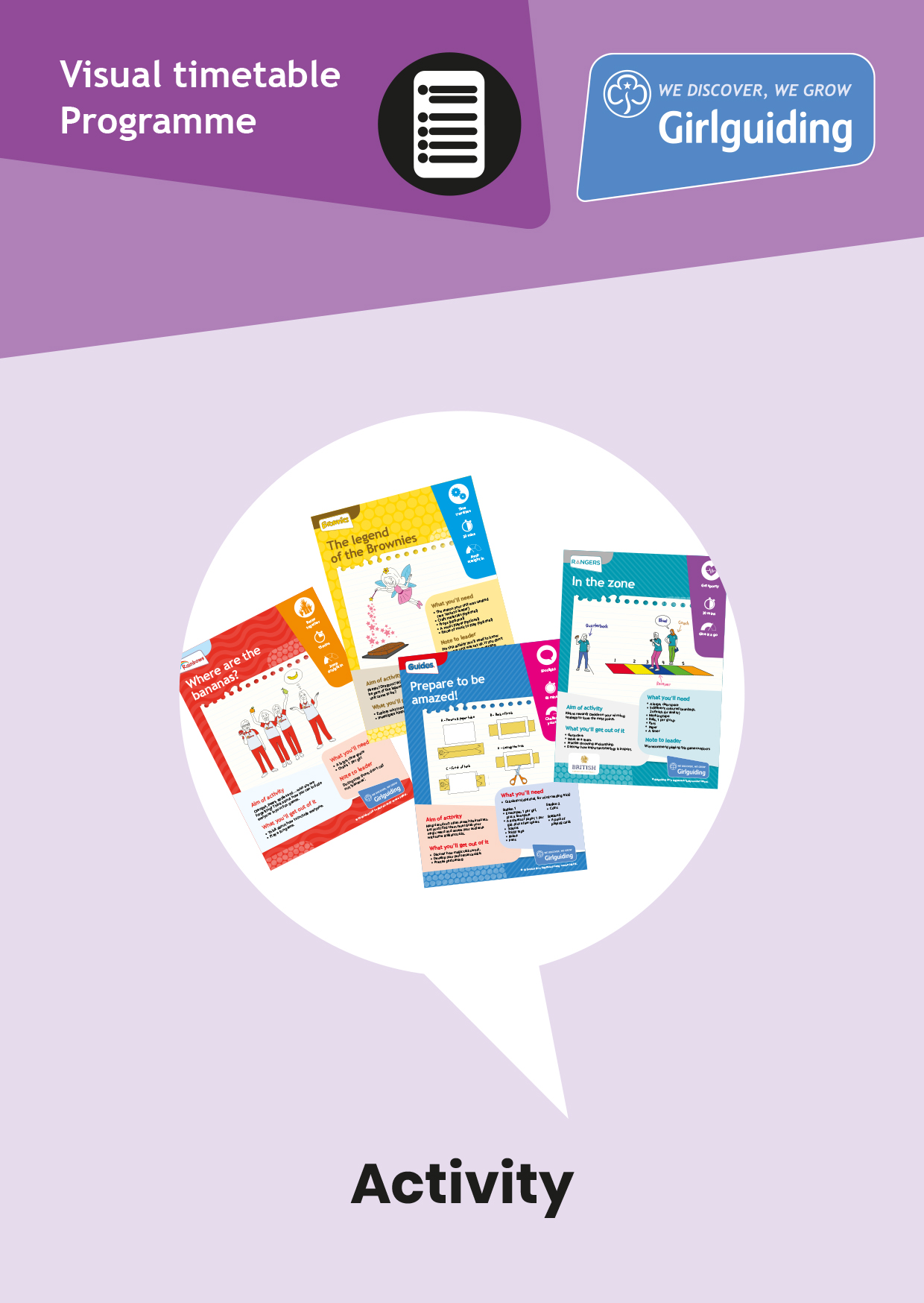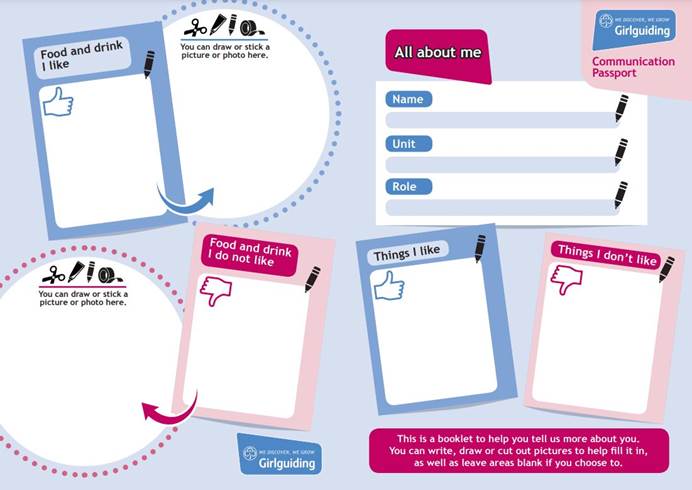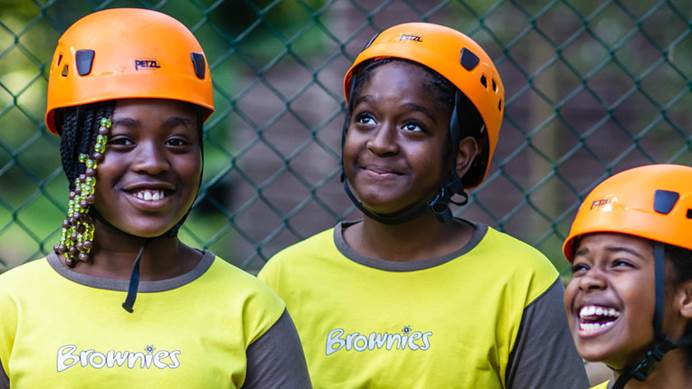Inclusive language and communication
How to make sure you communicate clearly with members with additional needs
It's important that everyone understands instructions and knows what's going on.
For girls with additional needs, not being able to understand instructions can be a barrier to them feeling comfortable and having fun.
Use these inclusive communication methods to ensure that everyone can understand information and instructions. Or scroll down to find and download our communication passports, developed with National Autistic Society (NAS), to help support a young member in your unit.
Inclusive language
The language we use shows members that they're in a safe and inclusive environment.
Taking time to use inclusive language shows members with different needs, experiences and backgrounds that you respect their differences and are taking steps to make sure that they feel included and valued.
There’s no single approach to inclusive language, as every member’s experiences and needs are different.
Top tips for inclusive language
- It’s always okay to ask. If you're not sure how to refer to a person or how to talk about their needs or background, ask them. They'll let you know the terms they prefer.
- If you make a mistake, apologise, correct the mistake and move on.
Unacceptable language
The use of insensitive or inappropriate language can create a hostile environment for people who have protected characteristics, as well as other members of the group.
All Girlguiding members are expected to follow the promise and for adult members our code of conduct too.
There may be times when you'll have to confront insensitive and unacceptable language. We've put together the following guidance to help you and make sure you have the tools you need to make Girlguiding as open and inclusive as possible.
What is unacceptable language?
Inappropriate or unacceptable language highlights perceived or actual differences between people.
This may have historical implications and is generally intended to cause offence. Even if framed under ‘being a joke’ this still isn't acceptable. Very often these can be linked to personal traits, such as a defining characteristic or sexuality.
As the English language is constantly evolving and developing, there may be some terms that were previously acceptable which are now considered offensive. There may also be some words which feel extremely removed from their original meaning.
If a person uses an offensive term to describe themselves
Sometimes individuals or communities reclaim offensive words or phrases to refer to themselves. If so, it's not always appropriate to challenge the individual on their use of that language. Make sure that you're careful about how other members of the group use these terms.
If a young person uses insensitive or unacceptable language
Calmly explain to them why the language might offend people and that this language isn’t acceptable.
You may wish to talk to the entire group about the language and use this to facilitate a wider discussion.
Don’t make an example of the person who’s used the language. And if the term was aimed at an individual or group, make sure to not bring attention to that group or individual. This may make them more uncomfortable.
If another adult uses offensive language
There may be times when another adult uses inappropriate or offensive language. If you're not comfortable challenging them on their language, consult your commissioner who’ll be able to give you further support.
Further help and guidance
Stonewall have produced a resource to help teachers challenge homophobic language. The resource, which will also be useful within a unit setting, provides straightforward and practical ways to tackle inappropriate language.
The government website has information on appropriate language to use when talking about disabilities.
Communication methods
- Be very clear about who you’re talking to. If talking to an individual, use their name. If talking to a group, say ‘Guides’, ‘Brownies’ or the relevant section name.
- Face the person that you’re talking to.
- When addressing a group, make sure that everyone has stopped talking before you begin.
- Put communication into context, for example: ‘In tonight’s meeting we will be…’
- Avoid using too many idioms.
- Use clear English.
- Give information in small chunks, rather than all at once.
- Structure information logically, for example: ‘First we will go into the room and then we will all sit down on the chairs’.
- Use simple questions to check for understanding, such as, ‘Who can tell me what we’re going to do?’
Visual signals
Visual signals can be a great way to get girls’ attention during meetings. They can be simple shorthand for communication and can prevent you from having to raise your voice.
It’s important to explain to any new girls and adults exactly what signals you use regularly, and what these mean. For example, when a leader raises their hand, this is a signal to be quiet. All the girls should then stop talking and raise their hands as well.
This explanation should include:
- Who's able to give the signal.
- What the signal is.
- What the signal is used for.
- What's expected from the girls.
Once non-verbal signals have been defined, make sure that they’re used consistently by all leaders.
Makaton
Makaton uses signs and symbols with spoken language to encourage communication skills and develop speech.
- Learn more about the uses of Makaton and some basic guiding phrases.
- Print these directions to signing the Promise - for each section - in Makaton and put up in your unit meeting place.
For more signing resources, visit the National Deaf Children's Society (NDCS) .
You can also check out the NDCS advice on D/deaf-friendly youth activities.
Written communication
When creating documents - such as letters to parents - do the following to make sure they are as clear as possible.
- Use a clear sans serif font, such as Poppins. The characters are easier to distinguish for people with reading difficulties or visual impairments.
- Select a font large enough to be read and with clear spacing between lines and paragraphs.
- Keep electronic copies of documents, allowing you to send digital copies and produce large-scale copies on request.
- When printing, use cream or off-white paper that isn’t glossy. Avoid using a design on the background that could obscure writing.
- Present information in a clear and logical way.
- Write in clear English.
Find out more about Girlguiding’s writing guidelines.
Visual timetables 
Some members might benefit from some extra visual communication. Units can order our free visual timetable resource if they have members who have access needs. The visual timetable resource has four sections to help with different communication needs:
- Feelings cards: The set of feelings cards can be used by young people who have a harder time letting leaders know how they feel. The young member can use the cards and give them to the the leader as needed.
- Meeting structure cards: Meeting structure cards can be used to show girls what is happening now, next and later in the meeting. There are also cards such as 'stop' which can be used with the meeting structure cards to give more information.
- Programme cards: The programme cards show members what they'll be doing during the meeting. There are general cards, such as 'activity' and cards specific to the Girlguiding programme.
- Special events cards: There are also cards included for events like World Thinking Day and residentials. They include a picture that can help a young member know what to expect.
If you need the visual timetable resource, email [email protected] with:
- Your name.
- The address to post the resource to.
- The access needs of the person they're for.
You can also print off the set of PDFs yourself.
Communication passports
Some young people may find it difficult to tell their leaders how they need to be supported. Communication passports are simple resources you can use with girls who have autism or learning disabilities. They give young people an informal way to tell you all about themselves – without the need to communicate verbally.
We've worked with the National Autistic Society (NAS) to develop our own printable communication passports for all sections.
Download a communication passport
There's a themed one for every section, and a general Girlguiding one too.
You can print out and give one of our passports to a young member in your unit. With the help of their parents, they can fill in their passports with everything that you need to know about them. They can write, draw or stick pictures onto the passports and give them to you before they start guiding.
These resources can be used to start a conversation with parents about how to support their child, and can travel with the young person to events so all leaders can learn about their needs.

Get advice on including all
Contact us for more information and advice about including all girls and volunteers in guiding.


